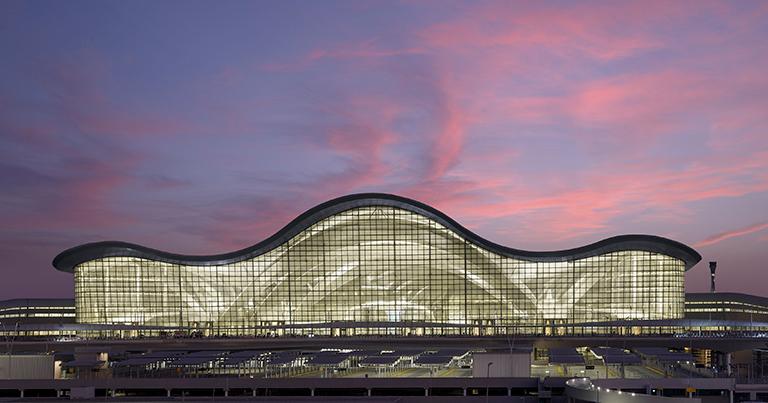Abu Dhabi International Airport is taking a major step toward the future of air travel by expanding its biometric smart-travel system. This high-tech upgrade aims to make airport procedures smoother, faster, and more convenient for passengers. The system uses facial recognition and artificial intelligence (AI) to streamline check-in, security checks, and boarding, reducing the need for traditional passports and paper documents.
With this technology, Abu Dhabi is aligning itself with other leading international airports that have adopted biometric systems to improve efficiency and security. The integration of AI and facial recognition will help in reducing congestion and making travel more stress-free, especially during peak hours. As global air travel continues to recover post-pandemic, these advancements are expected to encourage more people to travel without the usual delays and hassles.
How the New System Works

The biometric smart-travel system uses facial recognition cameras placed throughout the airport. When passengers arrive, their faces are scanned and matched with their travel documents. This technology allows travelers to move through various airport checkpoints without needing to show their passports or boarding passes repeatedly.

The system is designed to speed up airport procedures, making the journey more efficient. Instead of standing in long lines for check-in, immigration, and boarding, passengers can move through automated gates that recognize their faces within seconds. This will significantly reduce waiting times and eliminate the frustration caused by long queues at busy airport terminals.
Where the System Will Be Used
The new biometric system will be available at key points in the airport, including:
- Check-in Counters – Travelers can check in using facial recognition instead of presenting a passport. This will enable a touchless and seamless experience, reducing direct interaction with airport staff.
- Security Checkpoints – Automated gates will use biometrics to verify passenger identities, reducing wait times. This will also enhance security as biometric verification is highly accurate and difficult to forge.
- Immigration Control – Passengers can clear immigration with a quick face scan. This will help authorities process passengers more efficiently and improve border security.
- Boarding Gates – No need to show a boarding pass; the system will verify travelers using facial recognition. This will reduce last-minute boarding delays and speed up the entire boarding process.
Why This Matters for Travelers
The expansion of biometric technology is expected to greatly improve the passenger experience. Travelers will no longer have to worry about misplaced passports or long waiting times. The system enhances security while making the airport journey much more convenient.
Passengers who pre-register their biometric data with the airline or airport authorities will benefit the most. The technology will not only save time but also reduce human errors in document checks. Moreover, this system is designed to work with international security standards, ensuring that privacy and data protection remain top priorities. Authorities have assured that the data collected will be encrypted and stored securely, adhering to strict privacy laws.
Additionally, the implementation of biometric systems will also have a positive impact on airport staff. With fewer manual document checks required, airport personnel can focus on other essential tasks, ensuring a smoother operation overall. Airlines are also expected to benefit as faster processing times mean flights can depart on schedule, reducing costly delays.
A Step Towards a More Digital Future
Abu Dhabi Airport is joining a growing list of global airports using biometric technology to enhance efficiency. Airports in cities like Dubai, London, and Singapore have already adopted similar smart-travel systems.
By expanding the biometric system, Abu Dhabi aims to position itself as a leader in modern airport technology. The goal is to create a seamless travel experience for passengers flying in and out of the UAE. Officials believe this digital transformation will boost tourism and make Abu Dhabi a preferred transit hub. The UAE has been at the forefront of adopting smart technologies in various sectors, and this latest development further cements its reputation as a leader in innovation and digital transformation.
Industry experts have praised the initiative, calling it a game-changer for the future of air travel. According to analysts, biometric systems will soon become a standard feature in major airports worldwide. This shift towards automation aligns with global efforts to improve travel efficiency and security while minimizing human intervention.
What’s Next?
As the system is rolled out, authorities will continue testing and improving its performance. In the coming months, more travelers will be able to use the biometric smart-travel system at Abu Dhabi Airport.
Passengers who wish to use this system should check with their airline for registration details. Eventually, the technology could become the standard for international travel, replacing traditional passport checks entirely.
For now, Abu Dhabi International Airport is leading the way in making air travel smarter, faster, and more secure. The expansion of this biometric smart-travel system marks a significant milestone in the evolution of airport technology and is expected to set a benchmark for other airports around the world. With this cutting-edge innovation, travelers can look forward to a hassle-free and futuristic airport experience every time they fly through Abu Dhabi.
Also read: Middle East Becomes Fastest-Growing Renewables Market Outside China













